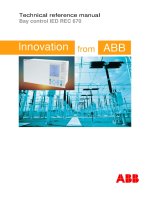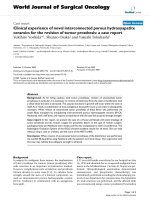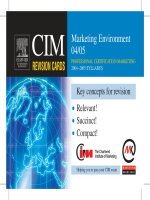Religious experience revision
Bạn đang xem bản rút gọn của tài liệu. Xem và tải ngay bản đầy đủ của tài liệu tại đây (933.08 KB, 15 trang )
Religious
Experience
Department of Philosophy and
Religion
Wellington College
Religious Experience and the argument
• A religious experience may be understood as any
encounter with God, or what is ultimate. It is an
experience of transcendent reality, seen in many
different ways in different faith traditions.
• There are actually a number of different types of
argument. For instance, some argue from ‘direct
awareness’ – the view that God can be known
intuitively (directly) by the person perceiving him. This
is very personal however, and has limited capacity to
persuade others.
• Most commonly, theistic philosophers have preferred
to talk about an argument from religious experience:
an inductive and a posteriori argument based on the
evidence of witnesses and testimonies.
A summary of the inductive argument
1. If an entity is experienced, it must exist
2. God is the sort of being that it is possible
to experience
3. People claim to have experienced God
directly
Conclusion:
God exists
God also uses PowerPoint to help revise.
A key supporter of the inductive
argument from religious
experience is the philosopher
Richard Swinburne. He offers the
following arguments:
Developing the argument:
Richard Swinburne
• In his book (Is There a God?) Swinburne claims that it is
reasonable to suppose that God would seek to engage and
interact with his creation. This would fit with the nature and
attributes of God: he is omnipotent and benevolent. If God
exists, we should expect religious experiences to take place.
• Swinburne defends the idea that those experiencing God
should believe intuitively what their senses tell them. He calls
this the Principle of Credulity.
• He also argues that we should trust those who give accounts of
religious experiences, if there is no reason to doubt them. He
calls this the Principle of Testimony. Swinburne readily admits
that known liars, those influenced by drugs, etc. should not be
trusted.
Essentially, Swinburne is trying to
leave the burden of proof with those
who doubt religious experiences. If
we experience something, we tend to
assume that this experience is
genuine. Why should it not be the
same with religious experiences?
If such experiences are genuine, it is
reasonable to conclude that God or
some higher power probably exists.
This line of argument is similar to the
one developed by William Alston in
Perceiving God – he claims that all
beliefs based on perception are prima
facie justified: “they are innocent until
proven guilty”.
The extraordinary nature of
religious experience
• A key objective for Swinburne and Alston is to
demonstrate that religious experiences should be taken
seriously despite their extraordinary nature.
• The idea of ‘innocent until proven guilty’ points to the
principle that we cannot doubt testimony simply because
it is unusual. After all, many people have experienced
unusual things accurately. Doubt must come for specific
reasons that find fault in a person’s testimony.
• Swinburne and Alston claim that their argument is
necessary for us to have any knowledge at all. That is, if
we doubted every unusual thing, we would never be able
to gain new knowledge of unusual things.
Other forms of argument
• A few other types of argument based on
religious experience might also be
considered, although they are less
favoured by modern philosophers.
• The ‘historical argument’ states that the
experiences of key individuals have been
so great and impressive that they must
be true: Mohammed, St. Paul, etc. Such
individuals had enormous influence after
receiving religious experiences.
• The ‘cumulative argument’ states that so
many people have had religious
experiences in the past that they simply
cannot all be making it up. God must be
the cause of (at least some of) this.
St. Paul – vision of Christ knocked him
off his horse
The trouble with these arguments
is that they’re very subjective and
ambiguous. Who’s to say whether
Mohammed has had a ‘great’
impact or not?
Also, it’s implausible that God
would be evident in all of these
differing experiences, since so
many are so different. Surely they
rule each other out.
The Varieties of Religious Experience
William James, author
of The Varieties of
Religious Experience
• A significant aspect of religious experience is the
considerable variety of types: conversions (like that
of St. Paul), corporate experiences, near death
experiences, or mystical encounters.
• The philosopher and psychologist William James
was impressed by this great variety. He thought that
the heart of religion lay in personal experiences
which for the individual would be “absolutely
authoritative”. James sees experiences as
personally persuasive, rather than as evidence to
prove God to others inductively.
• James regarded mysticism as a significant state of
mind or awareness, identifying four key features of
such important experiences:
(1) Ineffability – they cannot be explained (2) Noetic Quality –
they impart knowledge, (3) Transiency – they are over quickly,
(4) Passivity – they come upon the individual without being
sought after.
Key mystic:
Teresa of Avila
The basis of James’ theory:
Philosophical Pragmatism
• James is widely regarded as one of the
greatest modern philosophers, for founding a
theory of knowledge known as ‘pragmatism’.
• He writes, “the true is only the expedient in our
way of thinking”. That is, James argues that
we can never establish what is ‘true’ in an
absolute and infallible way. Instead, we decide
what is true according to what fits or what
‘works’ best in practical terms.
• James thus argues that religious experiences
express truth in pragmatic terms. They are
true to the extent that they help, improve, and
make sense of our lives in the world. They
support the existence of God for those who
benefit from such beliefs.
Weaknesses of the argument
The problem with an inductive argument is that it only ever gives
probable explanations for states of affairs. This can lead to questionable
‘leaps’ in the evidence. Claims to experience God can never amount to
proof as there are many alternative explanations: states of mind can be
chemically or drug induced, or they might be part of a natural and subconscious healing process (so Viktor Frankl), or they might result from
activity in the temporal lobes.
Philosophical critiques
A number of philosophers have also made criticisms of
the argument from religious experience. J.L. Mackie has
argued that it is wrong to draw evidence from people’s
claims to religious experiences on the grounds that there
are ‘disanalogies’ between these and other normal
experiences. Mackie states that religious experiences
have different characteristics from other perceptions, so
they should not carry the same degree of authority. They
are not part of the same scheme of shared and verifiable
experiences common in daily life.
Mackie: ‘Disanalogies’
between experiences
Ayer, verification
•
•
•
The argument from religious experience is also
challenged by the ‘verification principle’,
supported by the British philosopher and
atheist A.J. Ayer. This is the principle that a
proposition can only be meaningful if it could be
verified analytically or synthetically.
That is, we could only regard religious
experiences as meaningful if we could check
their truth through the logical sense of the
terms (analytically) or through gathering some
body of supporting evidence (synthetically).
Ayer is particularly critical of mysticism,
because it tries to ascribe significance to a
being (God) who, by definition, cannot be
meaningfully described. If there is no possible
way to check what is meant by ‘God’, then why
should we accept the validity of religious
experience?
Richard Dawkins
also
has something to say about this
debate. In his book The God
Delusion, Dawkins tells a story from
his student days. He recalls that a
fellow undergraduate was camping in
Scotland and claimed to have heard
“the voice of the devil – Satan
himself”.
In fact, it was just the call of the Manx
Shearwater (or ‘Devil Bird’), which
has an evil sounding voice.
not
convinced
For Dawkins, this highlights the key
problem with personal experiences.
They are often used in an appeal to
God because people are ignorant of
more straightforward physical or
psychological explanations for what
the perceive. It is an argument based
on ignorance.
Possible responses to criticisms
• Mackie’s claim that religious experiences are disanalogous with
normal experiences seems harsh. William Alston suggests that
there is continuity in our experiences, focusing on our ability to
check perceptions, detect regularity, share experience, and have
common views of public objects between cultures. Religion might
well fit into this scheme.
• Dawkins’ use of a personal anecdote is not revealing of religious
experience as a whole. In most cases, testimony or personal
experience are not easily deconstructed in natural or
psychological terms.
Contrary to Scooby Doo, there isn’t
always a ‘perfectly straightforward
explanation’.
Debating Ayer and Verification
• In Language, Truth and Logic Ayer claimed that statements
about God could not be verified in any way: “if the mystic
admits that the object of his vision cannot be described ...
he is bound to talk nonsense.” But can religious experience
really be criticised as meaningless, for lack of verification?
• Arguably, there are problems with Ayer’s arguments. Many
normal, everyday experiences are not verified either; in
social interactions we are used to taking things on trust,
unless there are reasons not to. The whole concept of trust
assumes that we do not require people to verify everything
they say; this is the key point of Swinburne’s ‘Principle of
Testimony’.
• The verification principle itself has been subject to criticism,
as it is not a principle that can be verified analytically or
synthetically. In that sense, is this statement about the
nature of knowledge really in any better position than
statements about religious experience?
Can we verify religious
experiences? What would a
good method be like?
What views of
knowledge do
the various
arguments
assume?
Burden of proof: do the
religious have to prove their
experiences are genuine, or
must sceptics disprove them?
Final Evaluation
Should God be something we can
experience for ourselves?
Can we defend
religious
experiences in
terms of
pragmatic truth?
Are religious experiences
really different from normal
experiences?









